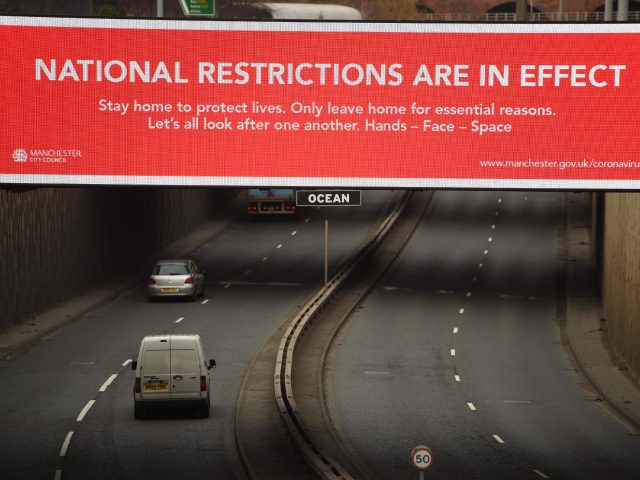Downing Street has warned of a “challenging” Winter ahead, suggesting that restrictions in reserve such as domestic vaccine passports could be imposed if the number of cases gets too high. While Professor Neil Ferguson has said that a Plan B may need to be implemented if Covid cases increase.
Prime Minister Boris Johnson’s spokesman said on Monday said that they are expecting an increase in Chinese coronavirus in the coming months and will be keeping a “close watch” on the figures, with Government adviser Professor Andrew Hayward claiming there was “huge potential for the NHS to come under a lot of pressure”.
The Number 10 spokesman said, according to The Guardian: “We obviously keep very close watch on the latest statistics. We always knew the coming months would be challenging.
“What we are seeing is case rates, hospitalisations and deaths still broadly in line with the modelling as set out a few months back now. The vaccination programme will continue to be our first line of defence, along with new treatments, testing and public health advice.
“But we will obviously keep a close watch on cases. But it is thanks to our vaccination programme that we are able to substantially break the link between cases, hospitalisations and deaths.”
It was only at the end of September that Prime Minister Johnson raised the possible restrictions that could be imposed under its “Plan B” for Winter Covid-19 pandemic planning, including the introduction of vaccine passports for certain indoor settings.
The spectre of Plan B was raised on Tuesday by Professor Ferguson, one of the architects of the first lockdown, who told BBC Radio 4’s Today programme in remarks reported by the Manchester Evening News that while he did not believe there would be another lockdown, “there may be a Plan B which needs to be implemented, which involves some rolling back of measures”.
Boris Johnson’s Govt Revamps Vaccine Passport Push Under Winter ‘Plan B’ https://t.co/5lKP4Lv3Xq
— Breitbart London (@BreitbartLondon) September 29, 2021
Over the past 11 months, government ministers and Mr Johnson have vacillated wildly on whether there would be domestic immunity passes, with the prime minister finally pledging on so-called “Freedom Day” — July 19th, when most of the restrictions from England’s third lockdown were lifted — that by the end of September, vaccine passports would be needed to entry to nightclubs and other such venues.
Unlike other proposals eventually brought into effect in Wales, Johnson’s proposal for an immunity pass would strictly be a vaccine passport, with no option to gain entry to the controlled spaces by proofing recent recovery from the Chinese virus or a negative test result.
By September 12th, Health Secretary Sajid Javid ruled out the introduction of vaccine passports — for now.
Days later, the measures were confirmed to have been included in the government’s Plan B, should cases surge in the hospital months, with other possible restrictions including the return of mask mandates, and working from home.
Mr Javid said at the time: “We’ve seen how quickly this virus can adapt and change. So we have prepared a Plan B of contingency measures we can call upon only if they are needed and supported by the data to prevent unsustainable pressure on the NHS.
“These measures would be: communicating clearing and urgently to the public the need for caution; legally mandating face coverings in certain settings; and whilst we’re not going ahead with mandatory vaccine-only Covid status certification now, we’ll be holding that power in reserve.”
Boris Defends Vaccine Passports, Calling Them a ‘Game-Changer’ and ‘Life-Saver’ https://t.co/hfDCYBDEJ5
— Breitbart London (@BreitbartLondon) September 15, 2021
If brought in, only those who have had at least two doses of a coronavirus vaccine would be issued the digital passport as an update to the NHS mobile phone app, which also stores a person’s vaccine status. The vaccine passport would be needed for nightclubs; indoor events with over 500 people; outdoor events, such as music festivals, of over 4,000 people; and sports arenas with a capacity of 10,000. There are exceptions for protests, religious ceremonies, weddings, and funerals.
Scotland brought into effect a vaccine passport to enter a similar range of venues with large capacities, with Wales passing a comparable law earlier this month, but which allowed for entry to those who can prove a negative coronavirus test result.
Controversy surrounded the Welsh measures, with the law passing by only one vote, amidst complaints that the lawmaker who could have defeated the bill was unable to get online to cast his ballot.
The Conservatives and its Member of the Senedd (Welsh assembly) Gareth Davies had claimed he was experiencing technical difficulties and could not log into the Zoom call for the hybrid Welsh parliamentary session. Others claimed Davies had been given ample opportunity to get in touch with the Senedd’s presiding officer, including the opportunity to vote by telephone. Mr Davies was at Conservative Party Conference in Manchester, England, at the time.
Conservative MP Chris Green from the national parliament warned that England should be “deeply concerned” about the passing of immunity certification in Wales, noting that now that half of the United Kingdom’s countries had some form of pass, it was only a matter of time before England and Northern Ireland “each have their own ID card”.
‘Saj the Javid’ and Vax Minister Are ‘Both Right’, Says Boris: Ten Months of Vaccine Passport U-Turns https://t.co/YGJr5F8qsw
— Breitbart London (@BreitbartLondon) September 14, 2021

COMMENTS
Please let us know if you're having issues with commenting.